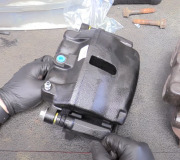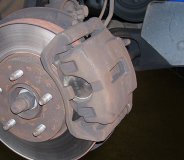The most likely cause is a sticking caliper on the right side but first of all, GM doesn't have much caliper trouble, and especially you aren't going to run into three of them. There are some other potential causes. When you get it to lock up again, park on a slight incline, (not a big hill, because I don't want to hear you had to chase after your car!), Shift it into neutral, then crawl underneath and open the right front bleeder screw. If the brake does not release, your new caliper is sticking. Since it's unlikely three pistons in three calipers would do that, I'd look closer at how the caliper is mounted. The mounting surfaces and slide bolts must be free of rust and pits and they must not be bent. All sliding surfaces should be coated with high-temperature brake grease, but even if they were not, you still shouldn't be having this problem.
If the brake DOES release at the bleeder screw, next time loosen the steel line at the master cylinder. If it does not release, suspect the rubber flex hose. There is a metal bracket crimped around the center of that hose. If rust builds up inside that crimp, it will constrict the hose. You'll be able to force fluid to the wheel by pushing the brake pedal but that fluid won't flow back when you release it. Use a large flat blade screwdriver to pry that crimp open a little to relax the hose. The additional clues are the brake pedal should feel higher and harder than normal.
If the brake does release when you crack the line open at the master cylinder, brake fluid is being trapped and can't get back into the master cylinder and reservoir.
GM has an oddball valve in the master cylinder that trips if the brakes aren't bled properly or if one of the two hydraulic circuits pops a leak. Since this is a "split-diagonal" system, that valve will block fluid flow to one front wheel and the opposite rear wheel. You will almost never notice a brake pull when that valve is tripped but the classic symptom is the pads on one front brake wear out real fast and the other side looks like new. You have a different symptom though in a brake dragging. That tripped valve doesn't cause dragging brakes.
Getting back to where the fluid is getting trapped, if the brake releases when you crack the steel line open at the master cylinder, suspect the brake fluid is contaminated with petroleum product. Sorry I can't tell you which line to loosen so you might have to try both of them. Proof of fluid contamination will be found by inspecting the rubber bladder seal under the reservoir cap. If it is ballooned up and mushy, you got junk. All of the rubber parts in the brake hydraulic system that come in contact with brake fluid are compatible only with glycol products. In petroleum products, they will grow and get soft. The lip seals in the master cylinder will grow past the return ports and block them. Eventually that will cause the left caliper to drag too. Lets hope it doesn't come to that. The fix for contaminated fluid is to replace every part with rubber parts that contact the fluid, flush and dry all of the steel lines, and refill the system with fresh, clean brake fluid. That means replacing the calipers, wheel cylinders, master cylinder, and all four rubber hoses. If any part is not replaced, the contamination will leach out of it into the new brake fluid and the problems will start all over.
Thursday, July 7th, 2011 AT 8:19 AM



